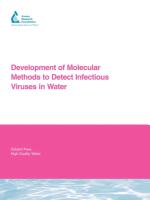Development of Molecular Methods to Detect Infectious Viruses in Water
BücherAngebote / Angebote:
Enteric viruses have been detected in environmental waters and potable water supplies. Water supply safety is evaluated by examination for bacteria that are not accurate surrogates for viruses that pose a public health threat in low levels. Current viral detection methods include standard techniques for in vitro cultivation in cell cultures and newer molecular methods for viral nucleic acid detection. The new methods are rapid and sensitive, but detect only the viral nucleic acid and do not determine infectivity. Methods for the detection of potentially infectious viruses are needed.
The objectives of this project were to
develop and evaluate sensitive, selective methods for infectious virus capture from water concentrates,
develop and evaluate cell culture combined with rapid, sensitive RT-PCR and PCR methods for detection of infectious viruses,
develop methods for rapid, sensitive, and specific quantitation of viruses,
validate the performance of methods for water sample concentrates containing assay inhibitory substances,
validate the ability of methods to distinguish infectious from non-infectious viruses inactivated by disinfectants with different inactivation mechanisms, free chlorine, and low pressure UV radiation, and
collect, concentrate, and archive raw and finished water samples for subsequent virus analysis.
New molecular tests such as RT-PCR or PCR may yield ambiguous positive results by detecting non-infectious or inactivated viruses. To overcome this problem, this study employed additional processing steps that depend on functional components of the virus needed for infection as an approach to detecting only infectious viruses. These methods were intended to preclude the detection of non-infectious viruses and increase the potential for detecting infectious viruses. Methods included the specific capture of virus by cellular receptors for virus in vitro, followed by molecular detection of viral nucleic acid in the captured virus. Another method demonstrated was the selection and detection of specific nucleic acid only present in the cell during virus replication. In addition, rapid real-time molecular tests that may be integrated with methods for the functional components were developed.
Folgt in ca. 15 Arbeitstagen

